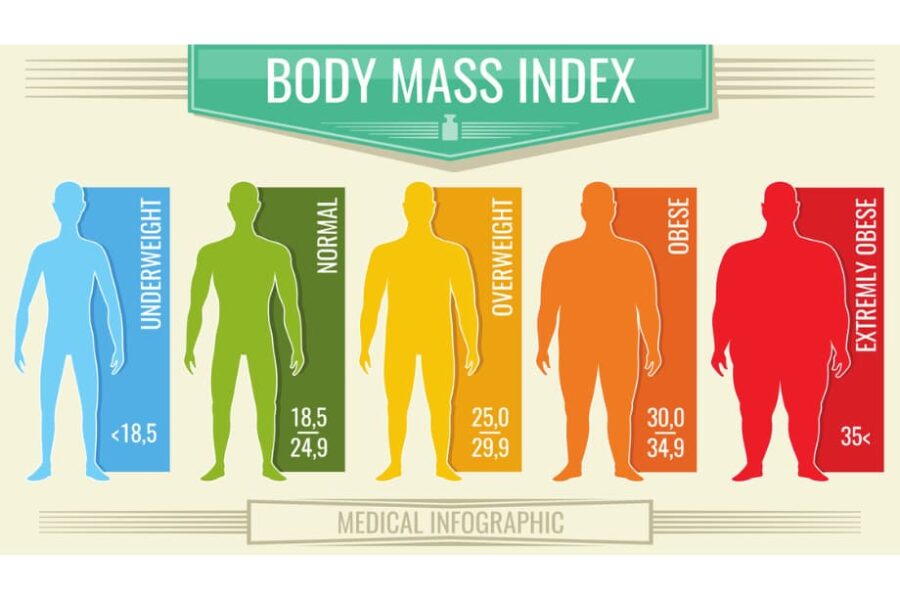The Fat Free Mass Index calculator (FFMI) is a tool designed to provide a more accurate estimate of your muscle mass. Unlike BMI (body mass index), which can be a useful tool for the average person, it has limitations and is known to be less accurate for athletes or people with high muscle mass. That’s where Fat Free Mass Index comes in.
Fat Free Mass Index accounts for this extra weight that comes from lean body mass. This is why FFMI is considered to be a more precise and reliable measurement for people who engage in sports or other physical activities that require high levels of strength and endurance.
In this article, we will explore what Fat Free Mass Index is, how it compares to BMI, and the Fat Free Mass Index scale that allows you to classify your results. But before we dive in, it’s important to note that in order to perform a proper calculation, you need to know your body fat percentage. If you’re unsure of this number, don’t worry – we’ve got you covered. You can use our body fat calculator to determine this important parameter.
With this information in hand, you’ll be well-equipped to use our Fat Free Mass Index calculator to get a better understanding of your body composition and take steps towards achieving your fitness goals.
So let’s get started!
FFMI calculator
[calc-appearance id=3]
How To Use The FFMI Calculator
Using the Fat Free Mass Index calculator is a simple and straightforward process that requires only a few inputs.
First of all, you need to gather the necessary measurements which are your height, weight (in either metric or imperial units) and your body fat percentage in percent units.
You can obtain your body fat percentage using our body fat calculator or through other methods which are much more accurate such as skinfold calipers or dual-energy X-ray absorptiometry scan (DEXA).
Once you have these measurements, input them into the required field in the FFMI calculator and click on the “Calculate” button once you’re done. The tool will then compute your Fat Free Mass Index score for you automatically and display it immediately on the screen.
It’s important to note that while the Fat Free Mass Index calculator is useful in determining one’s muscle mass potential, it does not take into account other factors that can affect muscle mass, such as age, sex, and genetics.
As such, it shouldn’t also be used as an absolute measure of health or fitness level. Instead, consider using it alongside other methods, such as dual-energy X-ray absorptiometry (DEXA), Bioelectrical Impedance Analysis or Magnetic Resonance Imaging (MRI), which may provide much more accurate results.
What is Fat Free Mass Index?
Fat Free Mass Index (FFMI) is a metric used to determine the amount of muscle mass in the body. It calculates the amount of lean body mass without taking into account any fat tissue. In other words, it measures how much muscle you have relative to your height and weight.
The Fat Free Mass Index has become popular among athletes and fitness enthusiasts as it provides a more accurate measurement of muscular development than traditional methods such as BMI. Unlike Body Mass Index (BMI), which calculates the ratio of weight to height, Fat Free Mass Index (FFMI) focuses specifically on the lean or fat-free mass of the body.
The fat free mass index makes use of three (3) parameters in order to calculate and generate a score of your muscle mass. These parameters include;
Body height – This is measured in either centimeter or feet and inches
Body weight – This is measured in either kilograms or pounds
Body fat – This is measured in percent only
How is Fat Free Mass Index (FFMI) Calculated?
Fat Free Mass Index (FFMI) takes into account an individual’s body weight, height, and body fat percentage to determine their muscle mass index, while excluding fat from the calculation.
There are several formulas used widely to calculate the Fat Free Mass Index of a body and other related measurements.
Here are the formulas according to each measurement:
For Total body fat use the following equation:
Total Body Fat = (Weight in kg × (Body Fat in % / 100)).
Result is expressed in kilograms [kg].
For Fat-free Mass use the following equation
Fat-free Mass = (Weight in kg * (1 – (Body Fat in % / 100))).
Result is expressed in kilograms [kg].
Fat Free Mass Index (FFMI) is calculated respectively:
For FFMI use the following equation
FFMI = (Fat-free Mass in kg / Height in meters^2).
Result is expressed in kilograms per meter square [kg/m²].
For Adjusted FFMI use the following equation:
Adjusted FFMI = (Fat-free Mass in kg / Height in meters^2) + 6.1 × (1.8 – Height in meters).
Result is expressed in kilograms per meter square [kg/m²], the same unit as FFMI.
These formulas above allow you to calculate muscle mass in the body but to save your time and stress, you can use our calculator for free. Furthermore, on our fat free mass index calculator, you are allowed to change the units which are displayed on the screen.
For your height and weight, you can either choose between metric (kilogram, centimeter etc..) or imperial (feet, pound, inches etc..) units, while your body fat percentage remains in percent unit.
FFMI Scores and their Interpretation
FFMI score for men
| FFMI Range | Body Fat | Description |
| 17-18 | 10-18% | Skinny man |
| 18-20 | 20-27% | Average man |
| 19-21 | 25-40% | Fat man |
| 20-21 | 10-18% | Athlete / Intermediate gym user |
| 22-23 | 6-12% | Advanced gym user |
| 24-25 | 8-20% | Bodybuilder / Powerlifter / Weightlifter |
FFMI score for women
| FFMI Range | Body Fat | Description |
| 14-15 | 20-25% | Skinny woman |
| 14-17 | 22-35% | Average woman |
| 15-18 | 30-45% | Fat woman |
| 16-17 | 18-25% | Athlete / Intermediate gym user |
| 18-20 | 15-22% | Advanced gym user |
| 19-21 | 15-30% | Bodybuilder / Powerlifter / Weightlifter |
Why is the FFMI Different for Men and Women?
Fat Free Mass Index (FFMI) is different for men and women because they have different physiological structures. Men tend to have more muscle mass and bone density than women due to higher levels of testosterone present in the body. Testosterone promotes the growth of lean body mass, making it easier for men to build muscle.
On the other hand, women tend to have a higher percentage of body fat compared to men. This is partly because oestrogen promotes fat storage in certain areas such as the hips and thighs. Women need fat in order to maintain their menstrual cycle and support childbirth.
It’s important to keep in mind that while gender plays a role in determining Fat Free Mass Index (FFMI) scores, individual factors such as age, genetics and lifestyle also contribute significantly. Ultimately, each person’s unique physiology will affect their Fat Free Mass Index (FFMI) score differently regardless of gender.
Correlation between BMI and FFMI
Body Mass Index (BMI) and Fat Free Mass Index (FFMI) are two commonly used measurements to determine one’s body composition. BMI has been the standard measurement for determining an individual’s weight status, but it does not account for muscle mass or body fat percentage. On the other hand, FFMI takes into consideration an individual’s muscle mass while also accounting for their height and weight.
A high BMI can be an indicator of obesity or being overweight, but this may not always be accurate as it does not consider muscle mass. For athletes or individuals with a higher level of fitness, they may have a high BMI due to increased muscle mass rather than excess fat.
There is a difference between gaining weight in an unhealthy way which isn’t a good thing and gaining muscles while engaging in various exercise routines and taking proper nutrition. This is where Fat Free Mass Index comes in as a useful tool.
It gives a more accurate representation of an individual’s body composition by taking into consideration their lean muscle mass compared to their overall weight and height and distinguishes between muscle gain and fat gain. This helps in identifying those who have a high BMI due to excess fat versus those with higher levels of muscularity.
While both measurements almost serve the same purposes, Fat Free Mass Index provides greater insight into one’s overall health and fitness level by accounting for lean muscle mass than Body Mass Index.
Benefits of Having an Healthy Fat Free Mass Index (FFMI) Score
Having a healthy Fat Free Mass Index (FFMI) score comes with numerous health benefits.
- It indicates that you have a higher proportion of muscle mass in your body as compared to fat, which can help you maintain optimal health.
- Individuals with healthy Fat Free Mass Index (FFMI) scores are often at a lower risk for developing chronic diseases such as obesity, type 2 diabetes, cardiovascular disease, and certain types of cancer.
- Maintaining a healthy Fat Free Mass Index (FFMI) score may also improve your confidence levels by enhancing your overall physique and appearance. This can lead to improved mental wellbeing and reduced stress levels.
Final Words
In today’s world, where fitness and health have become a top priority for everyone, it is important to understand how to measure our body compositions accurately. The Fat Free Mass Index (FFMI) calculator is an effective tool to do just that.
By using the Fat Free Mass Index calculator, we can determine our muscle mass and fat-free weight accurately. This can be crucial in creating a workout plan tailored specifically for our bodies and reaching our fitness goals.
Having a healthy Fat Free Mass Index (FFMI) score not only helps us maintain good physical health but also boosts self-esteem and confidence. It shows that we are taking care of ourselves by incorporating exercise and nutrition into our daily lives.
So, use the Fat Free Mass Index calculator regularly as part of your fitness routine and keep track of your progress towards achieving your desired results. Remember that every small step counts towards leading a healthier lifestyle!



